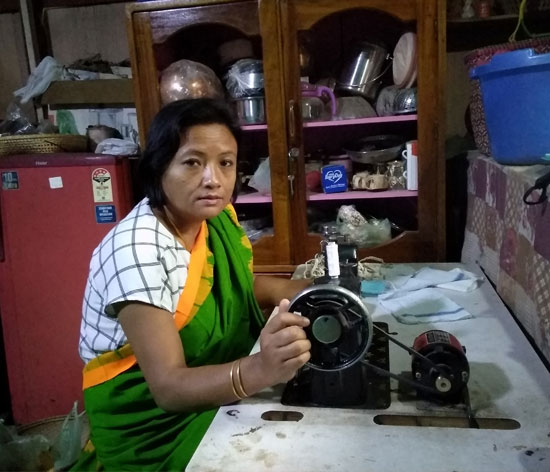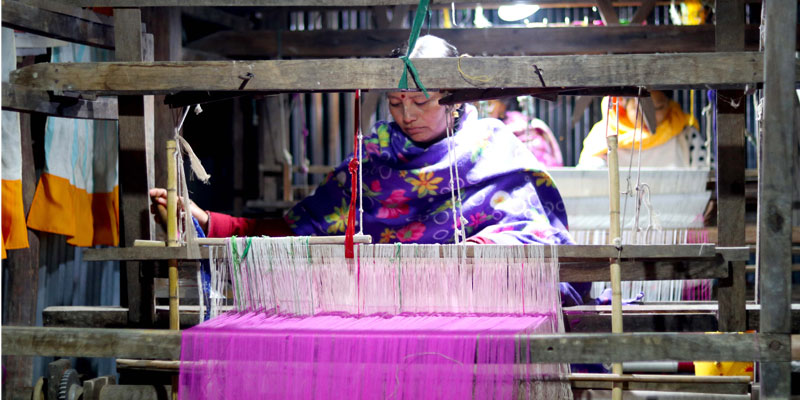
If it weren’t for the solar-powered sewing machine that she received under the Tata Trusts’ energy initiative, says Kanbagam Anandi Devi, she would not have been able to generate the income she does, especially in this pandemic situation. The Trusts’ ‘Ensuring energy security for communities living in remote areas in Manipur’ initiative, with support from its Associate Organisation Centre for Microfinance & Livelihood (CML) and implementation NGO partner SEVA – Self Employment Voluntary Associations, has helped local micro entrepreneurs generate livelihood opportunities during this crisis, while also helping the battle against the virus in a very basic way. Anandi, a resident of Brahmapur Chungkham village in Imphal East district of Manipur, is one of them.
The global health crisis has had a devastatingly disproportionate effect on the unorganised sector, especially micro-level enterprises in both rural and urban areas. The national lockdown that began in the third week of March 2020, and its subsequent extension, only exacerbated the situation causing untold disruption to the livelihood of hundreds of thousands of people. Manipur, like the rest of the country, is going through an economic crisis.

Anandi is one of the fortunate ones, who could still maintain a source of income during the crisis. For even though she owns a grid-connected electric sewing machine, she was in desperate need for a reliable power source to run it. Under the Trusts’ energy initiative she received a 75Wp solar panel with a battery capacity of 75Ah, and a solar-powered sewing machine which can run for 8 hours with a battery backup, all for a loan of Rs30,178. Now she has a reliable source of power, with a battery to store the excess so she can use it when she needs it.
By working with the CML, at the grassroots level, SEVA has adopted and disseminated solar energy solutions for basic home lighting and livelihood applications among poor rural households and energy-poor urban households. Under the Trusts’ programme SEVA has helped several micro entrepreneurs like Anandi, who work with solar-powered sewing machines, embroidery machines or at weaving centres. Financial support from UNDP under its Renewable Energy-based Livelihood Initiative to SEVA also helped expand the operations of existing solar-powered livelihoods promoted by the Trusts for micro entrepreneurs like Anandi, which will, in turn, help meet some of the challenges that have arisen due to the COVID-19 crisis.
For instance, when the government of Manipur mandated a strict masks’ policy while going out in public, they soon ran into an unexpected mini crisis. There was a shortage of masks. With the state being land-locked the logistics of getting masks from out of the state was a severe challenge. This is where micro entrepreneurs like Anandi stepped in. Using her solar-powered sewing machine, Anandi began to sew masks. She believes that, “Along with social distancing, masks go a long way to prevent the spread of the virus and I am very proud of the fact that I can be of help to the local people in their fight against the virus.”
By working 3-4 hours each day, Anandi is able to make 35-40 pieces of masks daily, which she sells for Rs30 apiece at the community level. The buyers are rural health service providers, NGOs, community-based organisations, and local clubs that provide volunteer services at banks, ration shops and mandis, as well as to senior citizens, orphanages and divyang. With access to local weaving centres for raw materials, Anandi makes a profit of Rs8 per mask. During the lockdown period, she reports having made a net profit of Rs12,000. Recently, Anandi received a bulk order for masks from the state government, from a joint initiative of SEVA, UNDP and the Directorate of Environment and Forests, Manipur. With her newly acquired solar-powered sewing machine, Anandi can work to her full potential even if there’s a power breakdown.
